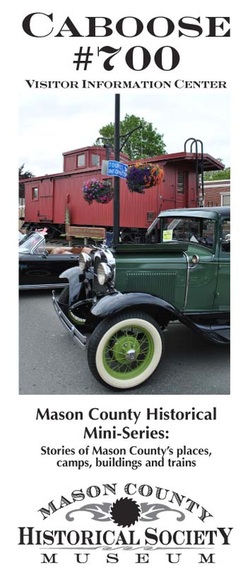Caboose #700
|
Caboose #700 was built in the 1920s in Shelton by the Peninsular Railroad Company, a subsidiary of Simpson Logging Company. It is a side-door caboose, which is unique in that it was used to haul less-than-carload freight bound for various camps. The caboose was also used to carry passengers to and from logging camps where railroads were often the only means of transportation available. Simpson’s Camp 5 was the last of the Simpson camps to be accessible by automobile as it did not have a road connecting it with the outside world until 1935.
Number 700 served the Peninsular Railway until 1936 when it became a part of the Simpson’s private logging railroad. In 1938 and 1939 it was converted for night service by the addition of lights powered by batteries which were recharged when not on a run. In 1946 it was equipped with a phone mounted on the wall below the cupola. One trainman would reach out a window with a long pole to connect the telephone to the telephone line alongside the railroad right-of-way, while the other trainman operated the phone itself. |
|
Long after other railroads had abandoned this type of caboose, #700 remained in service behind Simpson’s log trains. It was placed on standby service in the late 1950s and completely retired in 1965. It was then purchased the same year and moved to Snoqualmie and displayed by the Puget Sound Railroad Historical Association.
Number 700 remained in Snoqualmie until May 26, 1983, when it was loaded by a stacker on two low-boys, brought to Shelton and set in place by a large crane behind ‘Tollie’. Caboose #700 worked behind the Shay for many years traveling over this location on Railroad Avenue. At one time, the side-door caboose was very common on most large logging railroad systems and branchlines. Caboose #700 is probably one of the last surviving examples of this historic style of caboose. National Historic Register The Caboose and the ‘Tollie’ which are on the National and Local Historic Registers, are now used by the Shelton-Mason County Chamber of Commerce and serve as a tourist information center. It is staffed entirely by volunteers and serves as a monument to the logging history of the area. Tollie: Researched and Written by Peter Replinger |


